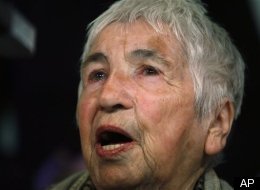Esther Bejarano, Auschwitz Survivor, Teams Up With German Rap Group

Now, 65 years after the liberation of the Nazi death camp, the 85-year-old has teamed up with the hip-hop band Microphone Mafia to spread her anti-racism message to German youth.
“It’s a clash of everything: age, culture, style,” Bejarano, a petite lady with an amiable chuckle, told The Associated Press ahead of Auschwitz Liberation Day on Wednesday. “But we all love music and share a common goal: we’re fighting against racism and discrimination.”
In Shalom, the first track of the CD Bejarano and the Microphone Mafia released last year titled Per La Vita, the bands sing about longing for world peace.
“My head is bowed, too many tears held back,” the song goes. “Worried I look around and see what happens, I’m not their leitmotif, which is the base of their lives: Violence, hatred and death, because too many people remained silent.”
The daughter of a Jewish cantor from Saarbruecken in western Germany, Bejarano grew up in a musical home studying piano until the Nazis came to power and tore her family apart. Bejarano was deported to Auschwitz, where she became a member of the girls’ orchestra, playing the accordion every time trains full of Jews from across Europe arrived at the death camp.
“We played with tears in our eyes,” Bejarano remembered. “The new arrivals came in waving and applauding us, but we knew they would be taken directly to the gas chambers.”
Bejarano survived, but her parents and sister Ruth were killed by the Nazis.
For the past 20 years Bejarano has played music mostly from the past – Yiddish melodies, tunes from the ghetto and Jewish resistance songs – with her children Edna and Yoram in a Hamburg-based band called Coincidence.
About two years ago, Kutlu Yurtseven, a Turkish immigrant rapper from the Cologne-based Microphone Mafia, got in touch with the band to see if they’d team up with them.
“Our band wanted to do something against the growing racism and anti-Semitism in Germany,” Yurtseven, 36, said in a phone interview Tuesday.
“Yoram told me that first of all he had to ask his mother Esther what she thought about a crossover project with a bunch of young rappers.”
Esther Bejarano, it turned out, thought hip-hop music “was really a bit too loud,” but also said she saw it as a good way to reach out to Germany’s youth.
“We want to keep the memories of the Holocaust alive, but at the same time look into the future and encourage young people to take a stand against new Nazis,” said Bejarano. “I know what racism can lead to and the members of Microphone Mafia are immigrants and have experienced their share of discrimination as well.”
Yurtseven, a Muslim, also sees a message of religious harmony.
“All religions ask to love and respect others and that’s what we do as well,” Yurtseven said.
The crossover of modern hip-hop and traditional Jewish folklore turned out to be quite a hit. The rappers have mixed Jewish songs with stomping hip-hop beats and also created new lyrics for some of the songs that are more accessible for a younger audience.
Last summer, the two bands released Per La Vita and a documentary about the band that was initially scheduled for the Auschwitz liberation anniversary is now supposed to be ready later this year to be shown at high schools across Germany.
The CD was released on a small, independent label and it was not clear how many copies were sold.
Currently, the troupe is touring through Germany. Their audiences range from teenage immigrants at metropolitan youth centers to a more established, older crowd that usually favors Bejarano’s classic approach to music.
“They all love it,” said Bejarano. “Even some of the older guests sometimes climb on the chairs and dance.”
Bejarano said it can be exhausting at her age to perform on stage with a bunch of youngsters but that she has found ways to adjust the shows to her needs.
“I’ve educated the boys,” Bejarano said with her trademark chuckle. “We’ve lowered the volume and I told them to stop jumping around on stage all the time.”
For Yurtseven and his fellow band members, the fact that they are performing with an Auschwitz survivor has been a unique experience as well.
“I once asked Esther how she can still make music after Auschwitz,” he remembered. “And she said that if they had also taken away the music from her, she would have died.”